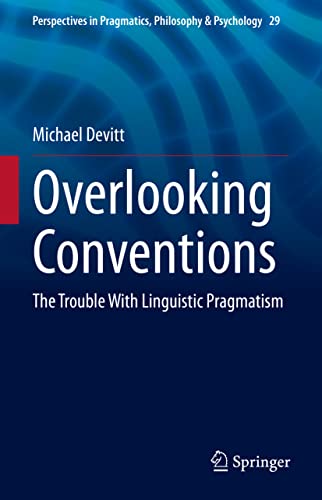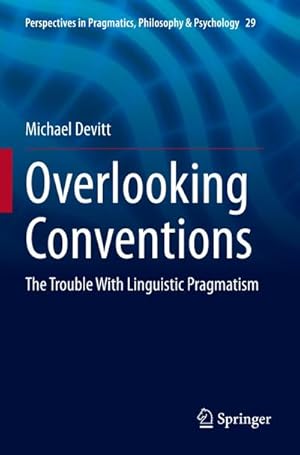overlooking conventions trouble linguistic von devitt michael (6 Ergebnisse)
Suchfilter
Produktart
- Alle Product Types
- Bücher (6)
- Magazine & Zeitschriften (Keine weiteren Ergebnisse entsprechen dieser Verfeinerung)
- Comics (Keine weiteren Ergebnisse entsprechen dieser Verfeinerung)
- Noten (Keine weiteren Ergebnisse entsprechen dieser Verfeinerung)
- Kunst, Grafik & Poster (Keine weiteren Ergebnisse entsprechen dieser Verfeinerung)
- Fotografien (Keine weiteren Ergebnisse entsprechen dieser Verfeinerung)
- Karten (Keine weiteren Ergebnisse entsprechen dieser Verfeinerung)
- Manuskripte & Papierantiquitäten (Keine weiteren Ergebnisse entsprechen dieser Verfeinerung)
Zustand Mehr dazu
- Neu (5)
- Wie Neu, Sehr Gut oder Gut Bis Sehr Gut (Keine weiteren Ergebnisse entsprechen dieser Verfeinerung)
- Gut oder Befriedigend (Keine weiteren Ergebnisse entsprechen dieser Verfeinerung)
- Ausreichend oder Schlecht (Keine weiteren Ergebnisse entsprechen dieser Verfeinerung)
- Wie beschrieben (1)
Einband
Weitere Eigenschaften
- Erstausgabe (1)
- Signiert (Keine weiteren Ergebnisse entsprechen dieser Verfeinerung)
- Schutzumschlag (Keine weiteren Ergebnisse entsprechen dieser Verfeinerung)
- Angebotsfoto (3)
Sprache (1)
Gratisversand
- Kostenloser Versand nach USA (Keine weiteren Ergebnisse entsprechen dieser Verfeinerung)
Land des Verkäufers
Verkäuferbewertung
-
Overlooking Conventions. The Trouble With Linguistic Pragmatism.
Verlag: Cham, Springer International Publishing., 2021
ISBN 10: 3030706524 ISBN 13: 9783030706524
Sprache: Englisch
Anbieter: Universitätsbuchhandlung Herta Hold GmbH, Berlin, Deutschland
Erstausgabe
1st ed. 2021. 1 Online-Ressource(XIII, 326 p. 1 illus.). Gebunden. Versand aus Deutschland / We dispatch from Germany via Air Mail. Einband bestoßen, daher Mängelexemplar gestempelt, sonst sehr guter Zustand. Imperfect copy due to slightly bumped cover, apart from this in very good condition. Stamped. Perspectives in Pragmatics, Philosophy & Psychology, 29. Sprache: Englisch.
-
Overlooking Conventions: The Trouble With Linguistic Pragmatism: 29 (Perspectives in Pragmatics, Philosophy & Psychology, 29)
Anbieter: Revaluation Books, Exeter, Vereinigtes Königreich
EUR 98,92
EUR 14,14 für den Versand von Vereinigtes Königreich nach USAAnzahl: 2 verfügbar
In den WarenkorbPaperback. Zustand: Brand New. 339 pages. 9.25x6.10x1.30 inches. In Stock.
-
Overlooking Conventions : The Trouble With Linguistic Pragmatism
Verlag: Springer International Publishing, 2022
ISBN 10: 3030706559 ISBN 13: 9783030706555
Sprache: Englisch
Anbieter: AHA-BUCH GmbH, Einbeck, Deutschland
Taschenbuch. Zustand: Neu. Druck auf Anfrage Neuware - Printed after ordering - This book criticizes the methodology of the recent semantics-pragmatics debate in the theory of language and proposes an alternative. It applies this methodology to argue for a traditional view against a group of 'contextualists' and 'pragmatists', including Sperber and Wilson, Bach, Carston, Recanati, Neale, and many others. The author disagrees with these theorists who hold that the meaning of the sentence in an utterance never, or hardly ever, yields its literal truth-conditional content, even after disambiguation and reference fixing; it needs to be pragmatically supplemented in context.The standard methodology of this debate is to consult intuitions. The book argues that theories should be tested against linguistic usage. Theoretical distinctions, however intuitive, need to be scientifically motivated. Also we should not be guided by Grice's 'Modified Occam's Razor', Ruhl's 'Monosemantic Bias', or other such strategies for 'meaning denialism'. From this novel perspective, the striking examples of context relativity that motivate contextualists and pragmatists typically exemplify semantic rather than pragmatic properties. In particular, polysemous phenomena should typically be treated as semantic ambiguity. The author argues that conventions have been overlooked, that there's no extensive 'semantic underdetermination' and that the new theoretical framework of 'truth-conditional pragmatics' is a mistake.
-
Overlooking Conventions | The Trouble With Linguistic Pragmatism
Verlag: Springer International Publishing, 2022
ISBN 10: 3030706559 ISBN 13: 9783030706555
Sprache: Englisch
Anbieter: preigu, Osnabrück, Deutschland
Taschenbuch. Zustand: Neu. Overlooking Conventions | The Trouble With Linguistic Pragmatism | Michael Devitt | Taschenbuch | xiii | Englisch | 2022 | Springer International Publishing | EAN 9783030706555 | Verantwortliche Person für die EU: Springer Verlag GmbH, Tiergartenstr. 17, 69121 Heidelberg, juergen[dot]hartmann[at]springer[dot]com | Anbieter: preigu.
-
Overlooking Conventions: The Trouble With Linguistic Pragmatism
Anbieter: Revaluation Books, Exeter, Vereinigtes Königreich
EUR 140,95
EUR 14,14 für den Versand von Vereinigtes Königreich nach USAAnzahl: 2 verfügbar
In den WarenkorbHardcover. Zustand: Brand New. 339 pages. 9.25x6.10x0.87 inches. In Stock.
-
Overlooking Conventions : The Trouble With Linguistic Pragmatism
Verlag: Springer International Publishing, 2021
ISBN 10: 3030706524 ISBN 13: 9783030706524
Sprache: Englisch
Anbieter: AHA-BUCH GmbH, Einbeck, Deutschland
Buch. Zustand: Neu. Druck auf Anfrage Neuware - Printed after ordering - This book criticizes the methodology of the recent semantics-pragmatics debate in the theory of language and proposes an alternative. It applies this methodology to argue for a traditional view against a group of 'contextualists' and 'pragmatists', including Sperber and Wilson, Bach, Carston, Recanati, Neale, and many others. The author disagrees with these theorists who hold that the meaning of the sentence in an utterance never, or hardly ever, yields its literal truth-conditional content, even after disambiguation and reference fixing; it needs to be pragmatically supplemented in context.The standard methodology of this debate is to consult intuitions. The book argues that theories should be tested against linguistic usage. Theoretical distinctions, however intuitive, need to be scientifically motivated. Also we should not be guided by Grice's 'Modified Occam's Razor', Ruhl's 'Monosemantic Bias', or other such strategies for 'meaning denialism'. From this novel perspective, the striking examples of context relativity that motivate contextualists and pragmatists typically exemplify semantic rather than pragmatic properties. In particular, polysemous phenomena should typically be treated as semantic ambiguity. The author argues that conventions have been overlooked, that there's no extensive 'semantic underdetermination' and that the new theoretical framework of 'truth-conditional pragmatics' is a mistake.






